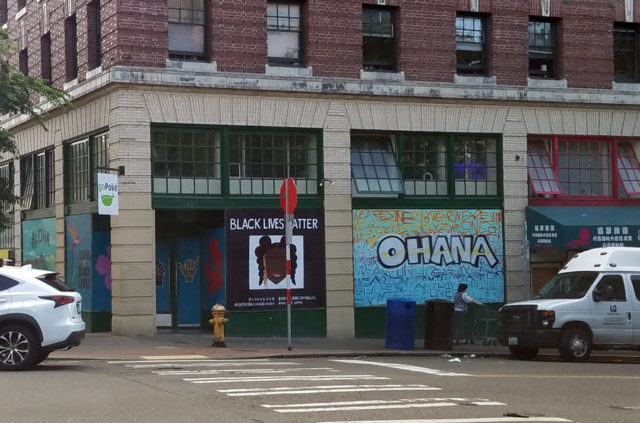by David Yamaguchi, The North American Post
The news footage of the Seattle protests of May 29-June 9 has shocked us all, for it has involved not only peaceful demonstrations against the killing of African American George Floyd, 46, by Minneapolis police. The marches have been accompanied by the burning of police cars, the vandalizing of stores, aggressive policing involving flash-bang grenades and tear gas, a car driving into a crowd, and a shooting.
The mayhem has included damage to over two dozen closed restaurants in the International District, from which many cash registers were stolen. The ID vandalism extends similar, probably racially motivated damage since late March in anger to China for COVID-19. The looting is opportunistic, as thieves know that demonstrations tie up the Seattle Police.
The largest issue at hand is the manhandling of black men and women by mostly white police, and the American societal inequities and lack of empathy across racial lines that foster it. How can we, as ordinary citizens, hope to address these difficult, long standing issues?
What began helping me see a path forward has been reading copies and forwards of email correspondence among UW faculty and staff. They illustrate how true leaders can set the tone for those that work under them. They make the point that while we as individuals cannot solve the nation’s ills, that we must each take ownership, and do what we can. I am excerpting some of that content here.
Ben Fitzhugh is an anthropology professor who has written on the prehistoric archaeology of the Kurile Islands, north of Japan. On May 31, he emailed:
“Bearing Witness”
“Dear [Research Institute] Colleagues,
“We live in troubling times. In the context of a pandemic that has thrown life as we know it into stasis and a slow motion economic disaster of unknown proportions, we are once again reeling from the poignant evidence of violence, social injustice and inequality boiling over onto the streets of our major cities. Already exhausted by the challenges of adapting to teaching in a pandemic, my emotions over the last few days have gone from shock, over the videotaped murder of George Floyd, to anger over the pervasiveness of racism and abuse of police powers of which it is just the latest example, to horror at the sight of burning vehicles and violence in the streets of Seattle and other major U.S. cities where mostly peaceful protesters sought to express outrage at systems that could protect and reinforce such violent and dehumanizing actions by those sworn to protect us.
“I feel strongly that those of us in leadership roles at all levels of the University… have a responsibility to reach out to those in our networks to acknowledge and bear witness to the pain and suffering caused by these injustices, injustices borne not just by those ‘elsewhere across the country’ but affecting the lives of students, faculty and staff on our campuses. It is in this context that I want to use this platform to help ‘break the silence.’ We may feel powerless right now, unsure how to affect positive change when cars are burning in our streets, but I believe it is important to recognize the pain and suffering that is moving mostly peaceful protesters in Seattle and around the country to put themselves at risk of virus and violence to be heard. ‘Tomorrow’ we can decide what else we might try to do about it…”
On May 30, Paul G. Ramsey, Dean of the UW School of Medicine, wrote the following with five co-signers including Edwina S. Uehara, Dean of the School of Social Work:
“Dear UW Health Sciences Community,
“Our country is once again experiencing the tragic realities of the racism present in our society.
“The slaying of Ahmaud Arbery while jogging in Brunswick, GA; the shooting death of Breonna Taylor by police in Louisville; the false and racist accusation against Christian Cooper in New York City; and most recently, the tragic killing of George Floyd as he was restrained by a police officer in Minneapolis.
“These are only the most recent manifestations of the racist ideologies we all need to confront and eliminate.
“All this is happening in the context of a coronavirus pandemic that is disproportionately impacting the health and economic well-being of Black families and communities in our state and country.
“These events are terrifying and exhausting for our Black colleagues, who are more likely to have experienced the loss of someone in their family and community, and to feel the very real heightened threat of racism.
“This isn’t something that only happens in other parts of our country. Our Black colleagues and students here at UW experience racist behaviors in their daily lives here in Seattle that are heartbreaking and wearing.
“In times like these, we want to affirm all of the feelings you are experiencing. They are real and valid. It is important that all of us… express and show support for our Black colleagues by standing against these continued injustices.
“Each of us needs to consider how best to do this within the context of our own roles and circumstances, but we all need to engage in action to create the healthy, equitable, and inclusive community we desire…
(NOTE) Full disclosure. David is currently completing a report for the UW as a technical writer.








